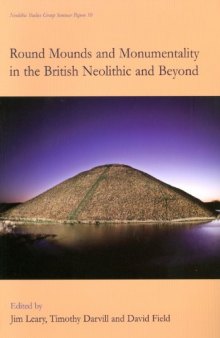 جزییات کتاب
جزییات کتاب
This volume, the tenth published collection of seminar papers from the Neolithic Studies Group, is based upon a conference that took place at the British Museum in November 2008. The meeting aimed to consider the chronology and development of Neolithic round mounds; their changing form and use; their relationships to contemporary cultural, ancestral and natural landscapes; the extent to which they provide scope for identifying local and regional social organization; and, not least, why they were round. Following the conference, further papers were offered for this edited volume, widening and broadening the initial discussion. The papers are arranged in rough geographic order starting in the north and working southwards before heading across the Irish Sea and then the Atlantic. Following a wide-ranging discussion of round mounds across the world, two papers discuss aspects of Scottish round mounds, before moving down to the Isle of Man, the Neolithic round mounds of the Yorkshire Wolds, Liffs Low in the Derbyshire Peak District, and round mounds on the Cotswolds. The volume then moves to Wessex, starting with a discussion of Silbury Hill, and followed by a re-evaluation of the Great Barrow at Knowlton, Conquer Barrow at Mount Pleasant, and the Hatfield Barrow at Marden. How archaeologists and heritage managers choose to interpret round mounds is the subject of the next paper, using Silbury Hill as the primary case study. This is followed by a broad discussion of circular traditions, particularly formative henges, in Wales and adjacent counties, round burial mounds in the Boyne Valley, Ireland, such as Knowth, Dowth and Newgrange, and Irish round mounds containing portal tombs. By way of comparison with the evidence from the British Isles, the volume then crosses over to North America for a broad discussion of mound-building traditions there. Rounding off the volume is another wide-ranging essay on the nature of round mounds, which challenges our very understanding and interpretation of them.
Table of Contents
1. Design, geometry, and the metamorphosis of monuments (David Field)
2. “… a place where they tried their criminals”: Neolithic round mounds in Perth and Kinross (Kenneth Brophy)
3. Scotland’s Neolithic non-megalithic round mounds: new dates, problems, and potential (Alison Sheridan)
4. Tynwald Hill and the round mounds of the Isle of Man (Timothy Darvill)
5. Recent work on the Neolithic round barrows of the upper Great Wold Valley, Yorkshire (Alex Gibson and Alex Bayliss)
6. “One of the most interesting barrows ever examined” – Liffs Low revisited (Roy Loveday and Alistair Barclay)
7. Neolithic round barrows on the Cotswolds (Timothy Darvill)
8. Silbury Hill: a monument in motion (Jim Leary)
9. The Brood of Silbury? A remote look at some other sizeable Wessex mounds (Martyn Barber, Helen Winton, Cathy Stoertz, Edward Carpenter and Louise Martin)
10. The Mystery of the Hill (Jonathan Last)
11. The formative henge: speculations drawn from the circular traditions of Wales and adjacent counties (Steve Burrow)
12. Monumentality and inclusion in the Boyne Valley, County Meath, Ireland (Geraldine Stout)
13. Round mounds containing portal tombs (Tatjana Kytmannow)
14. Native American mound building traditions (Peter Topping)
15. The round mound is not a monument (Tim Ingold)
 درباره نویسنده
درباره نویسنده
تیموتی دارویل انسانشناس، و باستانشناس اهل بریتانیا و استاد دانشگاه برنموت است. او بهعنوان یکی از معتبرترین مراجع در مورد استونهنج و عصر نوسنگی در بریتانیا شناخته میشود. او در سال ۲۰۱۰ به دریافت درجهٔ OBE در امپراتوری بریتانیا مفتخر شد.
 دانلود کتاب
دانلود کتاب
 جزییات کتاب
جزییات کتاب




 درباره نویسنده
درباره نویسنده

 این کتاب رو مطالعه کردید؟ نظر شما چیست؟
این کتاب رو مطالعه کردید؟ نظر شما چیست؟
